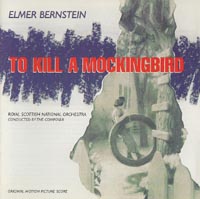
50th anniversary of
TO KILL A MOCKINGBIRD (1962)
and Elmer Bernstein’s great film score
In this FILM IN FOCUS article, Film music critic Roger Hall offers his personal view of this classic film score.
The Film

I consider this film to be one of the greatest films of the last half of the 20th century, not only for the poignant story and stellar acting, but also for the superb film score by Elmer Bernstein (1922-2004). There has been so much written about this classic film from 1962 starring Gregory Peck, Mary Badham and Robert Duvall in his screen debut, that I don’t feel it needs any further discussion from me. Instead, I will focus my remarks on…
The Score and The Composer
I think that the tide running against good music is so strong that none of us who care are surprised or outraged any more when we hear dumb music accompanying a film…Film has become, with some exceptions, a special effects medium. Films reflect the generally shoddy standards of present-day society. It’s a junk culture, and people buy junk …generally speaking, film has not advanced in terms of taste and intelligence, and that makes it tough for music.
–Elmer Bernstein
interviewed by Tony Thomas, quoted in Music for the Movies, 2nd edition, 1997.
That frank statement by Elmer Bernstein still applies when so much “junk music” is heard in many (but not all) of today’s soundtracks. When I was a young lad and frequent moviegoer, I suppose there was junk music then as well, but not by Elmer Bernstein. The early 1960s was a time of great films and major film scores. Just consider these titles from among many between 1960 to 1962:
THE ALAMO (music by Dimitri Tiomkin)
ELMER GANTRY (music by Andre Previn)
SPARTACUS (music by Alex North)
BREAKFAST AT TIFFANY’S (music by Henry Mancini)
LAWRENCE OF ARABIA (music by Maurice Jarre)
To that list must be added TO KILL A MOCKINGBIRD.
No film has lent itself more happily to this composer’s flair for lyrical intimacy; and in few films has any composer made so determined an attempt properly to penetrate a child’s children’s music in films is often the equivalent of the patronizing manner adopted by adults who have little understanding of or sympathy with children. Bernstein has the happy knack of writing children’s adult music, not adults’ children music.
— Christopher Palmer
In his notes to the 1978 LP album of the soundtrack,
For me, Elmer Bernstein was one of the composers in what I call the Great Film Composer Triad of the past half century. In addition to him the other two were: Jerry Goldsmith and John Williams. All three composers began their composing for TV or movies back in the 1950s. Two of them passed on in 2004: Elmer Bernstein and Jerry Goldsmith. And another major film composer, David Raksin, also died that year.
One of his Elmer Bernstein’s early scores was for ROBOT MONSTER in 1953, now considered one of the worst films ever made. I saw it as a young lad and still remember it vividly, mainly for the film score. I wrote about first watching this film on late night TV and what a lasting impression the score made on me. My story was written as an 80th birthday tribute to the film composer. You can read it at this link:
www.elmerbernstein.com
Between 1951 and 2002, Elmer composed over 200 scores for films and TV programs.
Here are some of his great film scores from 1955 to 1965
THE MAN WITH THE GOLDEN ARM (1955)
THE TEN COMMANDMENTS (1956)
THE MAGNIFICENT SEVEN (1960)
WALK ON THE WILD SIDE (1962)
THE GREAT ESCAPE (1963)
HAWAII (1965)
But the score that Elmer Bernstein picked as his favorite was – TO KILL A MOCKINGBIRD (1962)
I agree with his choice. This has one of the simplest and most delicate film scores ever composed. The opening Main Title features a delicate waltz tempo mixed with a more expansive theme which beautifully sets the mood for this drama of innocent childhood and racial prejudice. This is a masterpiece of subtle film scoring and one of the greatest from the past fifty years.
I listed it as one of the Top 100 Film Scores of the 20th Century in my book, A Guide to Film Music.
Elmer Bernstein had 14 Oscar nominations and strangely he received his only Oscar for his adapted score to a musical, THOROUGHLY MODERN MILLIE in 1967. He should have received at least several more Oscars for such landmark scores as THE MAGNIFICENT SEVEN and TO KILL A MOCKINGBIRD.
Later, he composed scores for “Saturday Night Live” alumni comedies like TRADING PLACES (1983) and GHOSTBUSTERS (1984).
He also wrote more serious film scores, like MY LEFT FOOT (1989)and THE GRIFTERS (1990).
Even though he was probably best known for his rugged outdoor western music, like the John Wayne westerns, Elmer’s ability to compose a subtle score was always evident, as in THE AGE OF INNOCENCE.
His last major score was FAR FROM HEAVEN, which I chose for The Sammy Award as Best Score of 2002. It was fortunate that he had the opportunity to close out his career with such a brilliant film score.
On the 50th anniversary of TO KILL A MOCKINGBIRD, I’m pleased that both the film and film score have continued to grow in popularity. They deserve that attention and are prime examples of great acting, directing and especially the masterful music score by Elmer Bernstein.
— Roger Hall, 12 November 2012
part of this article is reprinted from Lifetime Achievement Sammy Film Music Award for Elmer Bernstein

Read Roger Hall’s interview at runmovies.eu:
Elmer Bernstein: The Magnificent One
